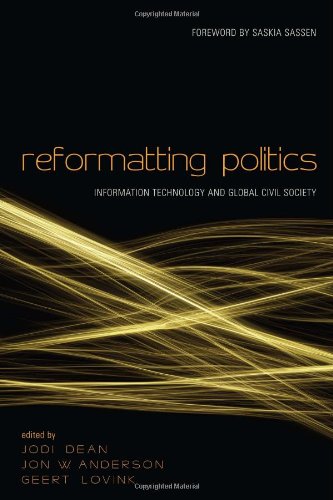(Ebook PDF) Reformatting Politics Information Technology and Global Civil Society 1st Edition by Jon Anderson, Jodi Dean, Geert Lovink ISBN 9781135442033 1135442037 full chapters
$50.00 Original price was: $50.00.$35.00Current price is: $35.00.
Reformatting Politics Information Technology and Global Civil Society 1st Edition Jon Anderson Digital Instant Download
Author(s): Jon Anderson, Jodi Dean, Geert Lovink
ISBN(s): 9780415952989, 0203957067
Edition: 1
File Details: PDF, 5.24 MB
Year: 2006
Language: english
SKU: EB-1390244
Categories: Politics & Philosophy - Social Sciences, Society
Tags: Geert Lovink, Jodi Dean, Jon Anderson
(Ebook PDF) Reformatting Politics Information Technology and Global Civil Society 1st Edition by Jon Anderson, Jodi Dean, Geert Lovink -Ebook PDF Instant Download/Delivery:9781135442033, 1135442037
Instant download Full Chapter of Reformatting Politics Information Technology and Global Civil Society 1st Edition after payment

Product details:
ISBN 10:1135442037
ISBN 13:9781135442033
Author: Jon Anderson, Jodi Dean, Geert Lovink
This book examines the ways in which new information and communication technologies (ICTs) are being used by civil society organizations (CSOs) to achieve their aims through activities and networks that cross national borders. These new ICTs (the internet, mobile phones, satellite radio and television) have allowed these civil society organizations to form extensive networks linking the local and the global in new ways and to flourish internationally in ways that were not possible without them. Reformatting Politics consists of four sections containing essays by some of the top scholars and activists working at the intersections of networked societies, civil society organizations, and information technology. The book also includes a section that takes a critical look at the UN World Summit of Information Society and the role that global governance has played and will play in the use and dissemination of these new technologies. Finally, the contributors aim to influence this important and emerging field of inquiry by posing a set of questions and directions for future research. In sum, Reformatting Politics is a fresh look at the way critical network practice through the use of information technology is reformatting the terms and terrains of global politics.
Table of Contents:
- Introduction
- I Networks
- 1 Net-Work Is Format Work: Issue Networks and the Sites of Civil Society Politics
- Introduction
- The Issue Network as a Site of Civil Society Politics
- Two Merits of the “Issue Network”
- When Social Networking and Info-Networking Are Not Enough
- ICTs as Mediators of Issue Formation
- Conclusion
- Notes
- 2 Organized Networks and Nonrepresentative Democracy
- The Network Problematic
- Networks and the Limits of Liberal Democracy
- Multistakeholderism and the Architecture of Net Politics
- Conclusion
- Notes
- References
- 3 Power Laws, Weblogs, and Inequality
- A Predictable Imbalance
- Notes
- 4 Openness and Its Discontents
- The Idea of Openness
- The Revolution Will Be Open Source
- Cryptohierarchies and Problems with Openness
- Openness: Open to All Constituencies
- Notes
- 5 Anybody Can Be TV: How P2P Home Video Will Challenge the Network News
- First Sightings of the New
- We’re Not Gonna Take It
- You, Too, Are a News Producer
- Live (via Wi-Fi) from Bryant Park
- P2P Television and Effective Video Blogging
- The Sense of What Is to Come: From Netroots to Infotainment to Go
- Notes
- II Sites
- 6 Communicating Islamic Fundamentalism as Global Citizenship
- Defining Islamic Fundamentalism
- Communicating Islamic Fundamentalism
- The Communication of a Pax Islamica
- Cyberwars
- Implications
- References
- 7 Lost in Transition? The Internet and Reformasi in Indonesia
- Introduction
- Civil Society, Civic Spaces, and Identity
- Suharto’s Panopticon: State Control and Surveillance
- The “Authorized Party”
- Containing Islam and Universities
- The Advent of the Internet
- The Internet and the Rise of Civil Society in Indonesia
- The Reformasi: From Cyberspace to the Physical Space
- Jihad in Cyberspace
- The Jihad Troopers
- Conclusions: the New Politics of Reformasi
- Notes
- References
- 8 Exploring the Potential for More Strategic Civil Society Use of Mobile Phones
- Introduction: “Emergent” Technology?
- “Extraordinarily Slender Literature”—Making Sense of the Mobile Revolution
- New “Mass” Medium—Ubiquity Equals Utility?
- More Strategic Mobile Phone Use—Enhancing the Audibility of Southern Voices?
- Concluding RemarksToward a Global Appopriation of the Mobile Phone
- Notes
- References
- 9 The Potential Role of Information Technology in International Remittance Transfers
- Notes
- 10 Network Technology and Networked Organizations
- Mini Case Studies for Internet Observation and Research
- The Implications of Network Based Organizations
- On Using Blogs
- On Using Wikis
- The Democratic Implications of User/Network Driven Projects
- Notes
- III Formats
- 11 Understanding the WSIS: An Institutional Analysis of the United Nations World Summit on the Information Society
- Conceptual Framework
- The World Summit Forum
- The Summit as Forum
- Implementation Mechanisms
- Understanding the WSIS
- Conclusion
- References
- 12 The End of the Experiment: The Failure of Democracy in ICANN
- Introduction
- ICANN’s History, Structure, and Importance
- The Failure of the experiment in Legitimacy through Openness
- The Failure of ICANN’s Experiment in Representation
- Conclusion
- Notes
- 13 Debating Communication Imbalances: From the MacBride Report to the WSIS
- The WSIS in Historical Perspective
- World Politics and Communication: Historical Precedents and Contemporary Transformations
- An Emerging Global Communications Movement
- Information and Communication Landscapes
- Analyzing the “Worlds of Words”: Documents and Voices
- Confronting Visions of Information and Communication in Society
- Conclusion
- Notes
- References
- 14 Trial and Error in Internet Governance: ICANN, the WSIS, and the Making of a Global Civil Society An Interview with Milton Mueller
- For Further Research
People also search:
reformation political cartoons
reformation political effects
reformation politics
a political reform
a reformation reader pdf
Tags:
Reformatting Politics,Information Technology,Global Civil Society,Jon Anderson,Jodi Dean,Geert Lovink


